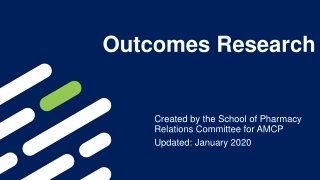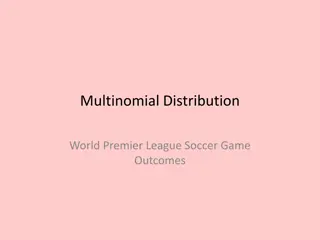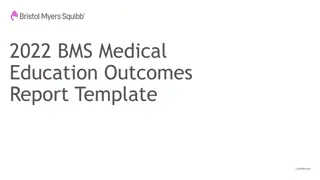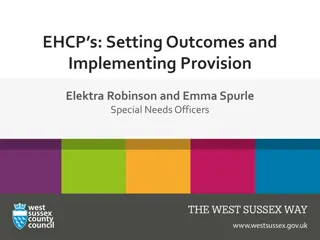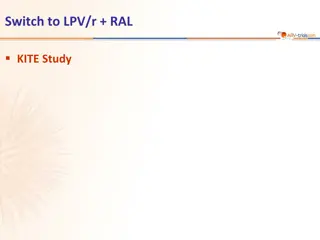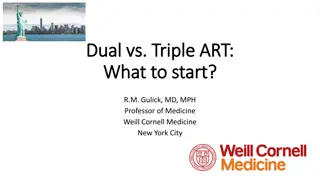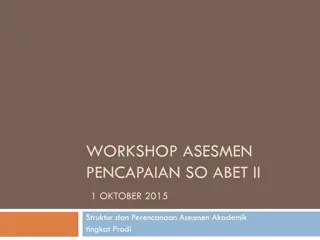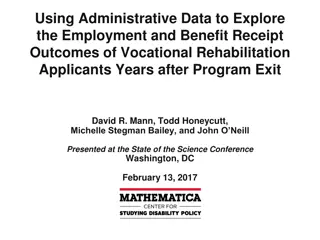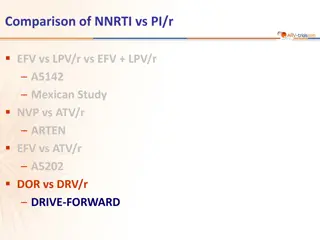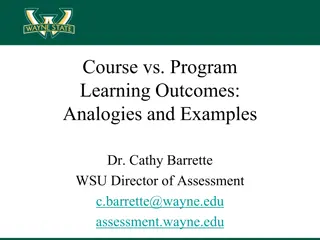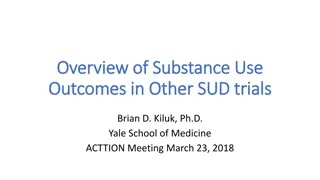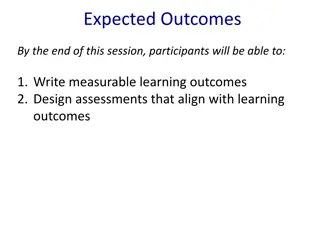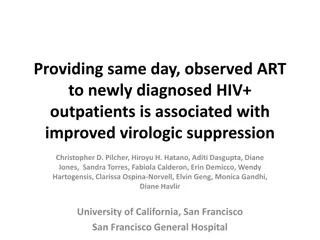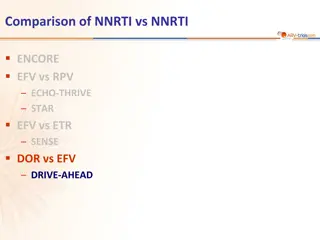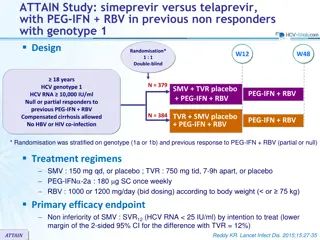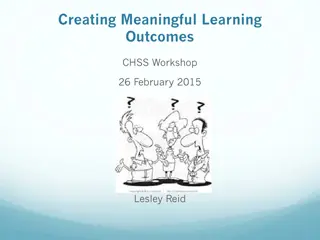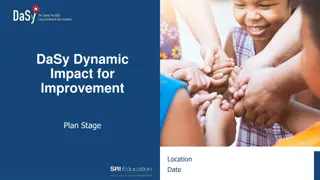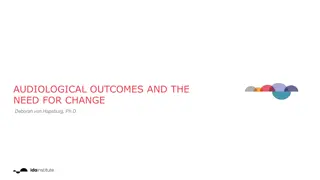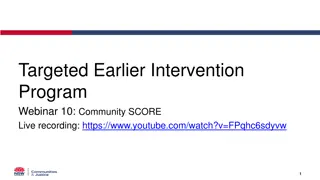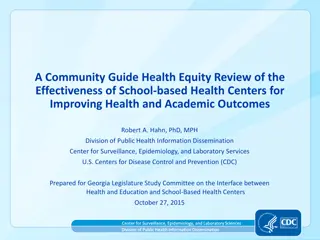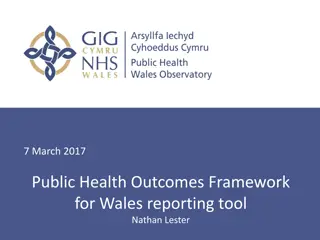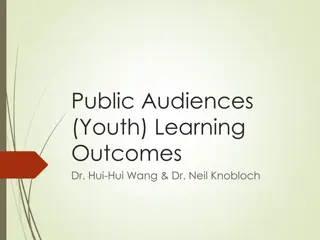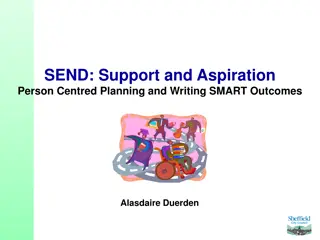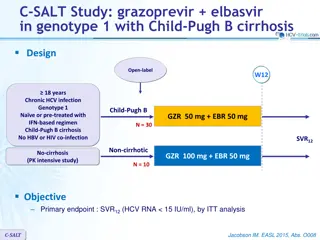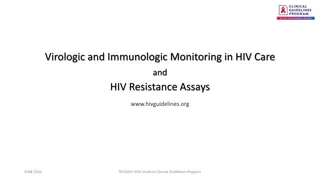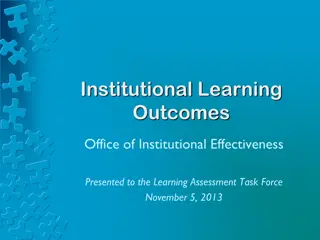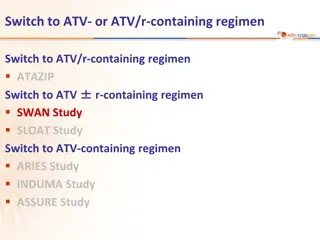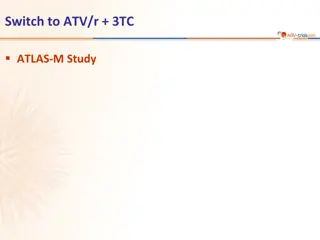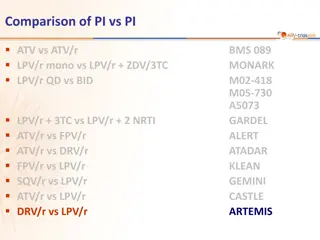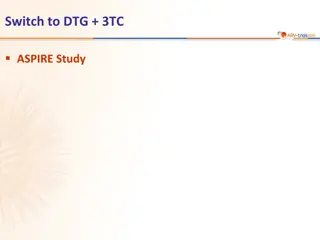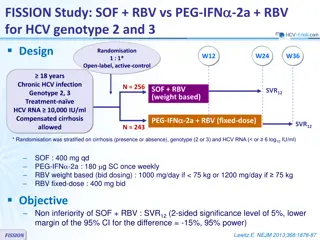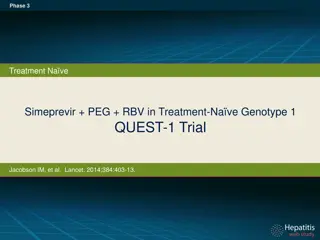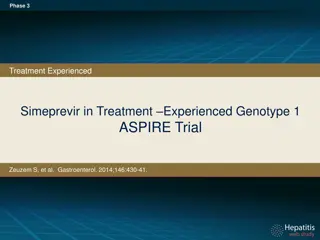Outcomes Research
Explore the definition and importance of outcomes research in managed care, including the tools used to measure clinical, economic, and humanistic outcomes. Discover the role of managed care pharmacists in outcomes research.
3 views • 20 slides
Prioritizing Clinically Important Outcomes Using Hierarchical Win Ratio
Clinical trials often use composite outcomes, but conventional analysis methods have limitations in accurately reflecting clinical reality. Hierarchical outcomes offer flexibility by defining a hierarchy of events based on importance. Analyzing trials using hierarchical outcomes involves comparing p
7 views • 20 slides
Understanding Multinomial Distribution in Statistical Analysis
Multinomial Distribution is a powerful tool used in statistical analysis to model outcomes of events with multiple categories. This distribution is applied to scenarios where each trial has several possible outcomes, and the sum of probabilities of all outcomes is equal to 1. By defining random vari
0 views • 8 slides
Comprehensive Medical Education Outcomes Report
This confidential report template outlines key instructions for creating and submitting outcomes reports in the field of medical education. It includes guidelines, slide templates, and specific data requirements for interim and final outcomes findings. The provided information must be accurately inp
0 views • 18 slides
Principles of Integrated Design and Alignment in Course Development
Explore the significance of alignment in course and assessment design, program development factors, defining learning outcomes, designing assessments, and the interconnection between outcomes, tasks, feedback, and grading. Understand how integrated design shapes teaching and learning processes suppo
0 views • 23 slides
Understanding Course Outcomes and Program Attainment in Engineering Education
Graduates of engineering programs in India are required to attain Program Outcomes (POs) identified by the National Board of Accreditation (NBA) through courses, projects, and activities. Course Outcomes (COs) define what students should be able to do at the end of a course and play a crucial role i
0 views • 63 slides
Understanding EHCP Outcomes and Provision for Special Educational Needs
EHCP outcomes and provision for special educational needs are crucial components outlined in a child or young person's Education, Health, and Care Plan (EHCP). Long-term outcomes are categorized into learning areas, while medium-term outcomes serve as steps towards achieving long-term goals. It is i
0 views • 15 slides
Harnessing Syndromic Surveillance Systems for Climate-Related Outcomes
Utilizing syndromic surveillance systems can provide valuable insights into the impact of climate change on health outcomes. This document aims to guide users on identifying outcomes, creating case definitions, combining data sources, and engaging with partners for effective climate and health surve
1 views • 28 slides
Effective Mapping Strategies for Aligning Student Learning Outcomes (SLOs) with Program Learning Outcomes (PLOs)
Explore effective strategies for aligning Student Learning Outcomes (SLOs) with Program Learning Outcomes (PLOs) to enhance PLO assessment. Understand the connection between PLOs and SLOs as key elements in the education mapping process. Discover top-down and bottom-up approaches to strategically ma
1 views • 13 slides
Switch to LPV/r + RAL Study: Efficacy and Safety Findings
This study, named KITE, focused on switching to LPV/r and RAL treatment in HIV patients without virologic failure. The trial included 40 participants continuing triple therapy, with primary endpoints being HIV RNA levels and event-free treatment failure. Results showed high virological response rate
0 views • 6 slides
Evolution of Antiretroviral Therapy: Dual vs. Triple ART
The evolution of antiretroviral therapy (ART) from dual to triple drug regimens has been crucial in improving outcomes for HIV patients. Research findings demonstrate the superiority of three-drug therapy over two-drug therapy in terms of efficacy and resistance management. Maintenance ART strategie
0 views • 17 slides
Academic Assessment Workshop on Program Educational Objectives and Student Outcomes
Understanding the significance of Program Educational Objectives (PEO) and Student Outcomes (SO) in academic assessment. PEO outlines career achievements while SO specifies knowledge and skills expected from graduates. Explore the anatomy of PEO, ABET Student Outcomes, and Program Specific Outcomes
0 views • 58 slides
Exploring Long-Term Employment Outcomes of Vocational Rehabilitation Applicants
This study utilized linked administrative data to examine the outcomes of Vocational Rehabilitation (VR) applicants up to 7 years after program exit. Findings showed varied outcomes based on employment status at closure, with better results for those who closed with employment. The research linked R
0 views • 20 slides
Comparison of DOR and DRV/r in DRIVE-FORWARD Study
DRIVE-FORWARD Study compared the efficacy of doravirine (DOR) with darunavir/ritonavir (DRV/r) in treatment-naive HIV patients. The study aimed to show non-inferiority of DOR based on virologic response at week 48. Results indicated similar virologic response rates between DOR and DRV/r groups, with
0 views • 10 slides
Understanding Learning Outcomes: Analogies and Examples
Explore the concept of learning outcomes through analogies with salads and maps. Learning outcomes are specific, measurable statements of what students should know or be able to do after completing a program. Discover how outcomes differ at various organizational levels and how course outcomes contr
0 views • 10 slides
Alcohol Use Outcomes in Substance Use Disorder Trials
This presentation provides an in-depth overview of assessing alcohol use outcomes in substance use disorder (SUD) trials. It covers various assessment methods, common outcomes like percent days abstinent and heavy drinking days, preferred outcomes such as percentage of heavy drinking days (PHDD), an
0 views • 19 slides
Effective Design of Learning Outcomes and Assessments
This session covers writing measurable learning outcomes, designing assessments aligning with outcomes, creating assessments for specific outcomes, analyzing assessments to determine intended learning outcomes, and the importance of clarifying expectations for students and instructors through learni
0 views • 16 slides
Rapid Initiation of Antiretroviral Therapy for Newly Diagnosed HIV+ Patients
Providing same-day observed antiretroviral therapy (ART) to newly diagnosed HIV+ outpatients is crucial for improved virologic suppression. Early initiation of ART post-diagnosis enhances patient outcomes, reduces transmission risk, and suppresses viral load effectively. Milestones of care at San Fr
0 views • 20 slides
Comparison of NNRTI vs NNRTI and DRIVE-AHEAD Study: DOR/3TC/TDF vs EFV/FTC/TDF
The comparison study explores NNRTI regimens alongside the DRIVE-AHEAD trial, focusing on DOR/3TC/TDF vs EFV-FTC/TDF. DRIVE-AHEAD assesses the efficacy and safety of DOR in ARV-naïve HIV patients, aiming for non-inferiority based on virologic response, with DOR exhibiting potential neuropsychiatric
0 views • 11 slides
Comparison of Simeprevir vs. Telaprevir in HCV Genotype 1 Non-Responders
The ATTAIN study compared simeprevir and telaprevir in previous non-responders with genotype 1 HCV. The study included 379 patients with simeprevir and 384 with telaprevir, focusing on SVR12 as the primary endpoint. Baseline characteristics, treatment regimens, patient disposition, and virologic out
0 views • 6 slides
Enhancing Learning Outcomes in Higher Education: Strategies and Considerations
Explore the significance of learning outcomes in higher education, including aligning curriculum, assessment, and teaching. Discover frameworks for writing effective learning outcomes and the impact on student understanding and skill development. Consider the complexities of measuring learning outco
0 views • 12 slides
Dynamic Impact for Improvement Plan: Achieving SMART Outcomes
Completing the Plan stage of the DaSy Dynamic Impact approach involves identifying SMART long-term outcomes, setting checkpoints, and outlining action steps. This process includes developing interim outcomes, defining responsible individuals, timelines, required resources, evidence of completion, an
0 views • 13 slides
Understanding Audiological Outcomes and Improving Hearing Aid Adoption
This presentation by Deborah von Hapsburg, Ph.D., delves into audiological outcomes and the need for change in the field of audiology. It discusses the patterns of outcomes, counseling approaches, and the relationship between client outcomes and counseling. The data presented covers topics such as h
0 views • 17 slides
Community SCORE - Outcomes Reporting Webinar
Explore the Community SCORE outcomes reporting tool in this insightful webinar. Learn how to effectively utilize Community SCORE for reporting client outcomes and satisfaction, benefiting individuals, groups, and communities. Discover the importance of measuring client outcomes and how it can enhanc
0 views • 30 slides
Effectiveness of School-based Health Centers for Health and Academic Outcomes
A review by Robert A. Hahn, PhD, MPH, for the Georgia Legislature Study Committee highlights the positive impact of school-based health centers on health and academic outcomes. Benefits include improved health outcomes such as increased vaccinations, reduced asthma incidents, and better health risk
0 views • 22 slides
Public Health Outcomes Framework for Wales Presentation Overview
This presentation provides an in-depth look at the Public Health Outcomes Framework (PHOF) for Wales, outlining its structure, key indicators, and overarching outcomes. The framework encompasses 13 outcomes across 3 domains, with a focus on promoting public health and addressing social determinants.
0 views • 21 slides
Understanding Public Audiences Learning Outcomes for Youth
Delve into the world of public audiences and youth learning outcomes to uncover the impacts intended for projects and programs. Explore how to craft effective learning outcome statements, identify where to find learning outcomes, and discover different categories of learning outcomes expressed as kn
0 views • 18 slides
Enhancing Person-Centred Planning and Writing SMART Outcomes in Sheffield City Council
Explore Sheffield City Council's commitment to person-centred planning and SMART outcomes for individuals with special educational needs and disabilities (SEND). Discover the focus on early identification, transparent information, and improved life outcomes through greater choice and control. Learn
0 views • 23 slides
Study on Grazoprevir and Elbasvir in Genotype 1 with Child-Pugh B Cirrhosis
The C-SALT study evaluated the efficacy of grazoprevir and elbasvir in patients with genotype 1 chronic HCV infection and Child-Pugh B cirrhosis. The primary endpoint was achieving sustained virologic response at 12 weeks. The study included treatment-naive and pre-treated patients with IFN-based re
0 views • 7 slides
Guidelines for Virologic and Immunologic Monitoring in HIV Care
These guidelines aim to assist clinicians in utilizing HIV viral load testing and CD4 count monitoring effectively in HIV care. They provide recommendations on the appropriate timing of tests to assess ART responses, address adherence barriers, and manage resistance assays. Regular monitoring is cru
0 views • 12 slides
Mesa Institutional Learning Outcomes Overview
Mesa's Institutional Learning Outcomes (ILOs) focus on core values such as communication, critical thinking, global awareness, personal awareness, civic responsibility, self-awareness, interpersonal skills, and technological awareness. These outcomes are designed to guide students in acquiring essen
0 views • 13 slides
SWAN Study: Switch to ATV-Containing Regimen in HIV Patients
The SWAN Study compared switching HIV patients from a protease inhibitor (PI)-based regimen to atazanavir (ATV)-containing regimens to evaluate non-inferiority in virologic rebound rates at week 48. The study showed lower virologic rebound rates in patients on ATV compared to PI, with higher efficac
0 views • 8 slides
Switch to ATV/r + 3TC: ATLAS-M Study
The ATLAS-M Study focused on switching to ATV/r + 3TC in participants with specific criteria, aiming to assess non-inferiority compared to ATV/r + 2 NRTIs. Results at W48 indicated a higher proportion free of treatment failure with ATV/r + 3TC, with notable differences in virologic failure rates and
0 views • 7 slides
Comparison of Protease Inhibitors in ARTEMIS Study
This study compares the efficacy and safety of different protease inhibitors (PIs) including ATV, ATV/r, LPV/r, FPV/r, DRV/r, and SQV/r in HIV treatment. The ARTEMIS study specifically focuses on comparing DRV/r and LPV/r in combination with TDF/FTC in ARV-naive patients. Results show non-inferiorit
0 views • 12 slides
Managing Antiretroviral Therapy Switches: Clinical Cases and Considerations
Explore clinical cases and considerations for switching antiretroviral therapy (ART) in patients with HIV. Topics include strategies for viral suppression, long-acting ART options, and managing virologic failure. Case presentations illustrate decision-making processes for optimizing ART regimens bas
0 views • 22 slides
ASPIRE Study: Switch to DTG + 3TC Virologic Outcome at W24 and W48
The ASPIRE study evaluated the efficacy of switching to DTG + 3TC in HIV patients with stable triple ART regimens. The primary endpoint was treatment failure proportion at W24, with non-inferiority demonstrated at W48. Virologic outcomes, adverse events, and patient dispositions were reported, with
0 views • 4 slides
Comparison of SOF+RBV vs PEG-IFN-2a+RBV for HCV Genotype 2 and 3 Treatment
FISSION Study compared the efficacy of SOF+RBV and PEG-IFN-2a+RBV for HCV genotypes 2 and 3 in treatment-naive patients with chronic HCV infection. The study included 256 participants in the SOF+RBV group and 243 in the PEG-IFN-2a+RBV group. The primary objective was to determine the non-inferiority
0 views • 6 slides
Simeprevir Combination Therapy in Treatment-Naïve HCV Genotype 1 Patients: QUEST-1 Trial Results
The QUEST-1 trial evaluated the efficacy and safety of simeprevir in combination with peginterferon and ribavirin versus peginterferon and ribavirin alone in treatment-naïve patients with chronic HCV genotype 1 infection. The study showed a significantly higher proportion of patients achieving sust
0 views • 14 slides
Simeprevir Treatment in HCV Genotype 1: ASPIRE Trial Results
The ASPIRE trial evaluated simeprevir treatment in patients with treatment-experienced chronic HCV genotype 1 infection. The study design included different dosing regimens of simeprevir with peginterferon and ribavirin, compared to placebo. Results showed varying sustained virologic response rates
0 views • 9 slides
Study on Long-Acting Therapies and Virologic Outcomes in HIV Treatment
Faculty from different parts of the world presented at the Conference on Retroviruses and Opportunistic Infections in 2023, discussing a randomized study comparing long-acting therapies to oral treatment for HIV. The study, known as SOLAR, showed promising results in virologic outcomes at the 12-mon
0 views • 41 slides
